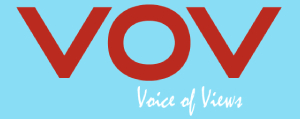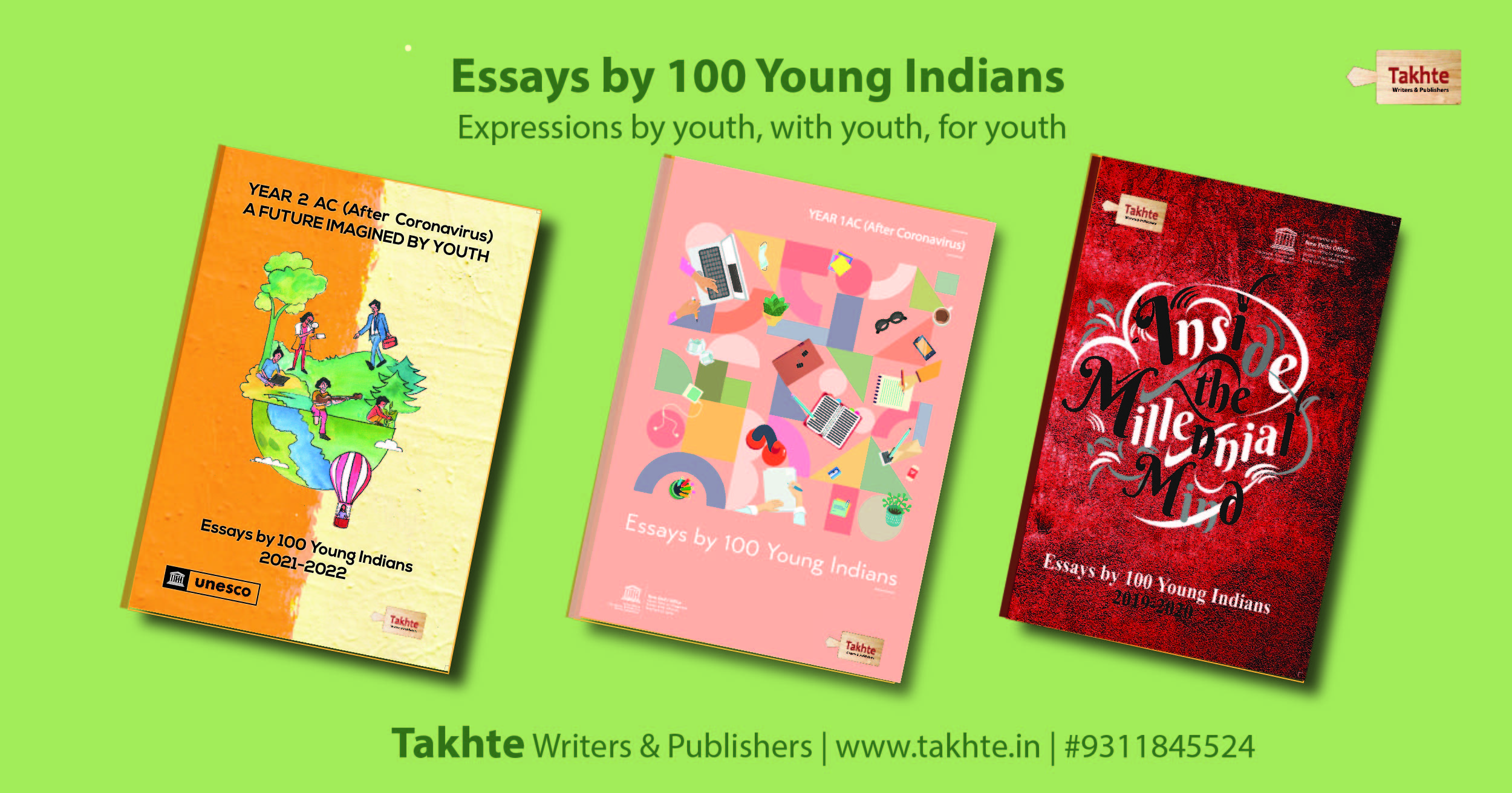Contest Essays
YEAR 2 AC (After Coronavirus): A Future Imagined by Youth

Raabia Ali Abidi
Amity International School,
M-Block, Saket,
New Delhi
Weekly Winner
(Pan India Online Essay Contest 2021- 3rd Edition)
Category – Children
Essay Topic:
The pandemic has alerted us about our broken relationship with nature. What lessons can we learn for a better future on issues related to climate change, biodiversity and the environment?
“In the ecosystem, every action has a reaction”. There can be no renewal of relationship with nature without the renewal of humanity itself. The pandemic made us reflect on our relationship with the environment and our very existence depends on the same.
The environment is no one’s property to destroy; it is everyone’s responsibility to protect. Everything in this world is interconnected. All may work in harmony to have a balanced system.
We have a perfect example of, COVID-19, the pandemic we all have suffered together. When we disrupted this balance and didn’t stop our harmful actions, the harmony was disarrayed.
To be in harmony with nature is essential to nourish our souls and live a balanced and positive life. There is no better example of human’s relationship to nature than the idea of sustainable development. We must focus on sustainability if we wish to live in peace with nature. Unfortunately, we have been extending in the opposite direction. Nature is seen to be fragmented and diminishing, and we must preserve the best examples for future generations.
The rapid expansion of the human population and the consumer society makes us the dominant invasive species. Therefore, the protection of the environment to ensure human welfare becomes the topmost priority. Our Earth is so beautiful then why must we cause it pain? The pandemic has brought profound social, political and economic changes and environmental challenges to the world.
The virus may have emerged from wildlife and transmitted to humans, and spread due to trade. This pandemic came into our lives like an unwilling guest at times of extensive environmental issues like forest fires, cyclones etc. These issues call for a solid response to support the environment. To avoid pandemics from happening, we need to please nature with our efforts and not destroy it by urbanisation, illegal activities, etc. It’s also crucial to promote biodiversity. These days, varied species are getting extinct. Climate change has also become a vital issue faced by the whole world. If we want to develop, then we need to respect Mother Nature. As charity begins at home and education is the golden key to success, we can educate our ecosystem about such critical issues.
Only when we learn to live in harmony with nature, could we expect nature to behave in the manner that has been there for several hundred years. When man indulges in affecting nature and its composition, humankind will be forced to repent for generations. This should be avoided at any cost, for the development of mankind as it has been intertwined with nature and wildlife. Any break in their ranks would not augur well for the future. Only when people go against nature will they forced to face nature’s fury. When righteously made, the link between nature and humankind can inspire youth to build ways supporting the two. Nature and humans are two sides of the same coin; one cannot even exist without the other.
So, let’s come forward to protect our ecosystems, starting with making wastage minimum. I am an ecosystem, and the ecosystem is in me, so why not protect it with utmost sincerity?
Contest Essays
UNESCO and Takhte launch third book of youth essays ‘Year 2 AC (After Coronavirus)’
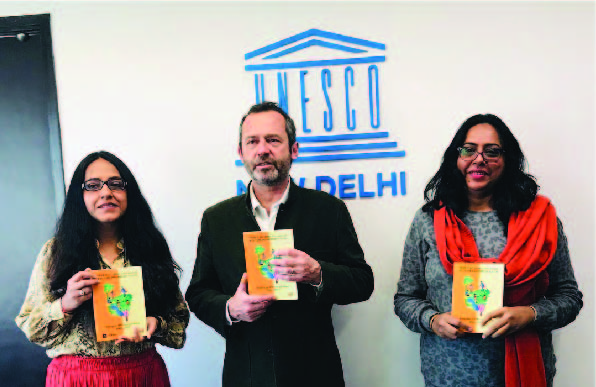
Continuing with the momentum of the previous editions of their pan India essay contest, the UNESCO New Delhi Cluster and Takhte launched the third edition of the Essay contest book, ‘Year 2 AC (After Coronavirus): A Future Imagined by Youth’ on 17 December 2021.
The book contains a compilation of 100 winning essays written by young Indians and presents their unique perspectives on the challenges that youth face in the wake of the COVID pandemic – from disruption to education, to massive increases in the use of digital challenges. The contest presented them with a platform to imagine solutions to these challenges, both for the short and long terms. Over 900 submissions from across 30 States and Union Territories were received.
The book is a must-read to understand the observations, perspectives, and foresight of young writers across India. It includes a plethora of issues covered by the young writers, varying from education to culture, community to biodiversity, and the environment to disruptions in tourism. The anthology of essays is distinctive and unique, providing an important space for young people to demonstrate their knowledge, capacities, and drive for action.
“This book serves as a repository of reflections drawn directly from the minds of young people across India. What is so inspiring about these essays, however, is that a common thread can be found in young people’s desire and energy for change. They are demonstrating that they have the knowledge and wherewithal to step up and be part of the solution as we recover from the challenges of the pandemic,” said Eric Falt, UNESCO New Delhi Director.
“Writing can be therapeutic. Children and youth must pen their thoughts as it can be incredibly relieving during these challenging times. Channelling the energy to the exclusive way of expressing and journaling can help one find better solutions,” said Goldie Kasturia, Founder -Takhte & VOV.
Reposted from UNESCO, New Delhi website
The book can be purchased from Takhte’s cart https://takhte.in/cart.php
Contest Essays
YEAR 2 AC (After Coronavirus): A Future Imagined by Youth
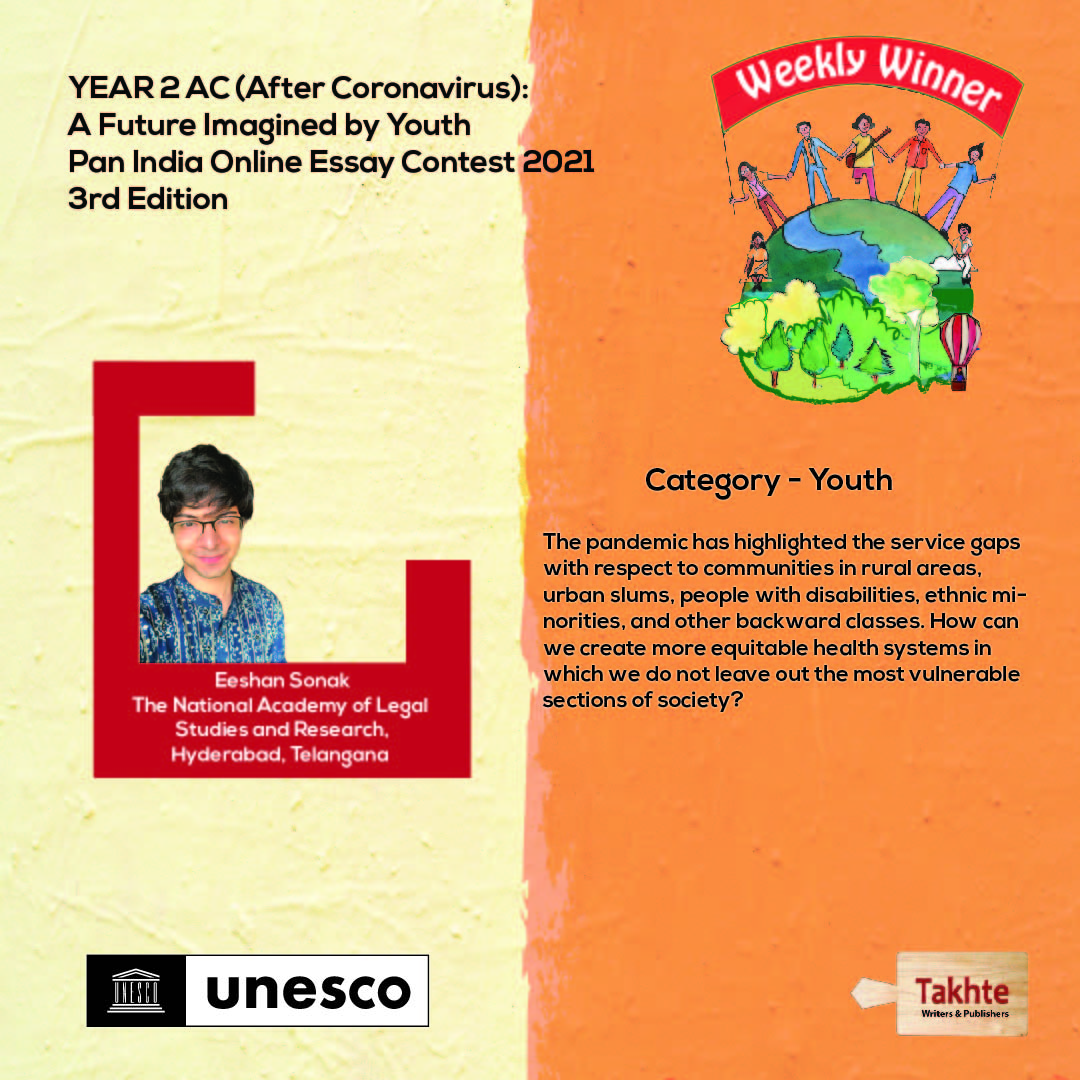
Eeshan Sonak
The National Academy of Legal Studies and Research
Hyderabad
Telangana
Weekly Winner
(Pan India Online Essay Contest 2021- 3rd Edition)
Category – Youth
Essay Topic:
The pandemic has highlighted the service gaps with respect to communities in rural areas, urban slums, people with disabilities, ethnic minorities, and other backward classes. How can we create more equitable health systems in which we do not leave out the most vulnerable sections of society?
Justice Albie Sacha, the legendary South African Jurist, while hearing the Soobramoney case, was faced with a moral dilemma. Mr Soobramoney, a patient suffering from chronic renal failure, approached the South African Supreme Court asking to order the state hospital’s dialysis service to keep death away for as long as its machines could keep him alive. The hospital’s limited resources meant that only a few renal failure patients could be administered life-saving dialysis treatment. Mr Soobramoney did not qualify for treatment at the State’s expense, as he was unlikely to recover even after treatment and only hoped to gain a few years of life.
Reading about this case and the difficult choice the Court had to make in refusing to interfere was my first introduction to the moral complexity of the enforcement of socio-economic rights. I learnt that resources are always limited. By their very nature, socio-economic rights involve rationing. Such rationing cannot be considered a restriction of the right to access services like healthcare, but the very precondition for its proper exercise. Unlike the right to free speech, which by its very nature is not rationed, the right to access health care is shared, often competitively, with other holders of the right. Therefore, socio-economic rights must have different legal characteristics from the exercise of a classical individual civil right that is autonomous and complete in itself.
While the framing of our Constitution guaranteed first-generation civil and political rights, it has been far from successful in ensuring a progressive realization of second-generation socio-economic rights such as food, housing, health, education and welfare. The inequitable distribution of services has always been regarded as an inherited consequence of past injustice and no indications of a failure to meet current societal obligations.
In this essay, as a law student, I shall use the law and public policy lens to approach the inequitable distribution of healthcare services. As I see it, there are two co-related issues involved: first, the scarcity of healthcare services and resources, and second, the cornering of the few available resources by the dominant classes. In rural India, the first issue poses a, more significant problem. In contrast, in the urban metropolis, we see that the issue is not the inadequacy of facilities but their skewed distribution.
In addressing the first issue, I would draw a parallel to the environment I am most comfortable with- the law school setting. Like most law students in the top tier, National Law Universities seek corporate placements, many of the most gifted medical students seek jobs at high paying private hospitals in urban areas or even abroad. Apart from the existing policies; there should be measures that incentivize a civic sense of community service and social impact. I believe that this model would better tackle the crisis of inadequacy of medical services in rural India. However, understandably, the issue of capacity building in the healthcare sector is a mammoth task that must be progressively achieved.
What is less spoken of and equally destructive is the second issue- the cornering of existing services by a few. In the realm of health, no individual can be faulted for using their resources to gain the best possible treatment or care. I think the burden of addressing this concern rests on those formulating healthcare policy. Private hospitals often enjoy far greater infrastructural facilities and other resources vis-à-vis government hospitals. Apart from strengthening Government hospitals to bridge this wide gap, we could have a policy mandatorily requiring private hospitals to play a more significant part in the cost-free treatment of vulnerable sections of society. In sum, I see instilling a civic sense in the populace and introducing policies as the way forward in addressing the issue of our inequitable health systems.
Contest Essays
YEAR 2 AC (After Coronavirus): A Future Imagined by Youth
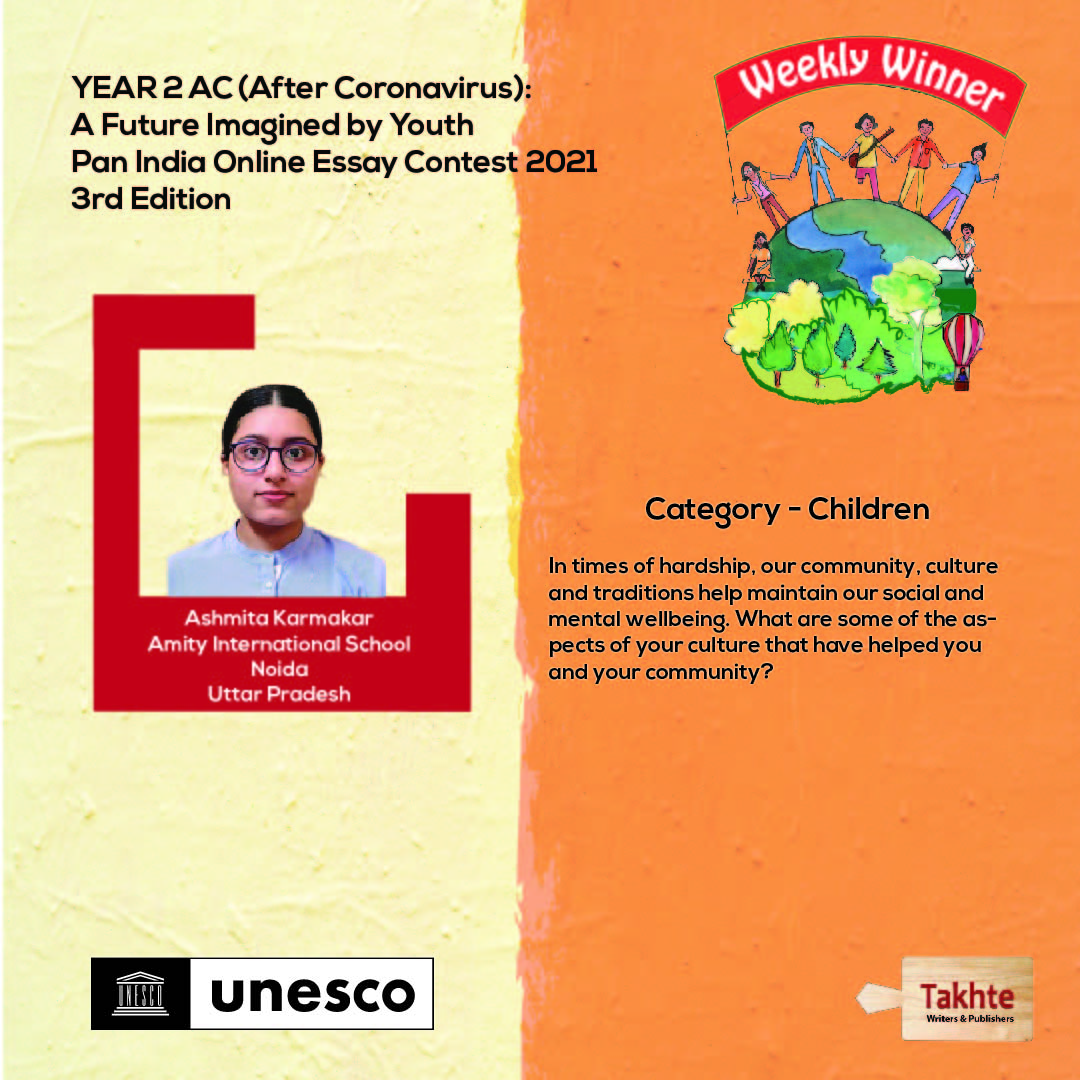
Ashmita Karmakar
Amity International School
Noida
Uttar Pradesh
Weekly Winner
(Pan India Online Essay Contest 2021- 3rd Edition)
Category – Children
Essay Topic:
In times of hardship, our community, culture and traditions help maintain our social and mental wellbeing. What are some of the aspects of your culture that have helped you and your community?
WAS IT HALF-EMPTY OR HALF-FULL?
As Trisha pressed the ‘Leave’ button, she sighed in distress. She averted most of the homework assigned by her English teacher. Today, she dropped yet another topic for an essay beyond her understanding. She exclaimed to herself, “How does she expect us to write a 200-word essay on the ‘Positive Side of the pandemic’?”. Trisha rushed to her grandmother, her problem-solver and support system.
As she knocked on the door impatiently, Trisha’s grandmother already knew that this knock of impatience must have taken birth from a homework dilemma that her granddaughter often encounters. She called Trisha in. And, with her grumpy slight frown, Trisha cribbed, “Dadi, I think English ma’am is an alien. How can she give such absurd topics to write essays on?” Granny laughed, and as she was about to comment, her talkative granddaughter continued. “You won’t believe what she gave us for homework today”, she continued. “She told us to write an essay on the ‘Positive Side of the Pandemic’, that too in 200 words”.
“I am positive that she was joking. How is there any positivity in the pandemic, nothing good has happened during this crisis! Millions died around the world; economies fell, thousand were left jobless, and..” she went on complaining about the Pandemic. Grandmother didn’t interrupt Trisha until she paused to catch hold of her breath, and she started speaking. “Trisha, any situation in life must be looked upon from two sides or perspectives. Every situation, including this pandemic, has both a positive and a negative side. You kept on complaining, as you only looked at its negative side. It is true that during today’s time, the negative impact of the pandemic is more prevalent, but this doesn’t mean that one can overlook its positive impact. Although, the positive may be in the minority, still, it is there. Your teacher has assigned you this Home-Work to encourage young children like you, widen your perspective, and not only rely upon one side of the situation. I hope you can understand what I am trying to explain.”
“No, no, Dadi. I am not able to understand. If it is so, then can you please tell me WHAT are Positive Impacts are? How can I look from a different perspective when only one perspective is present in this situation?”
Grandmother started narrating a story to Trisha. As they reached the end of the story, she asked Trisha, “What do you think, dear, was the glass half-empty or half-full?”. Trisha replied, “Granny, I think the glass is half-full; the protagonist should understand this, shouldn’t he? He should always look at things with a positive outlook!”. Grandmother, alas, said, “Trisha, just like the glass, every situation can be either looked upon through a positive viewpoint or a negative one. Like, the same glass, could be half-empty for one person and half-full for another, we can see the pandemic, too, with a positive outlook. It not only has its share of positive impacts, but it can also lead to some ever-lasting beautiful changes in the world. Now, put on your thinking caps and start working on your homework, okay sweetie?”
“Yes, granny”, she excitedly remarked. “I will get nothing but A+ grade in this essay, I promise. Thanks a ton, Dadi, you are the best!!”. She ran to her room with an enlightened mind and an energised soul.
The next day, she read out her essay and finished by saying, “In the end, I would like to mention if the ‘Glass was half-full or half-empty”. I think it was always full as the bright side always overshadows the dark side, no matter how dark the side is! Thank you!” As she muted herself, a huge round of applause and an array of compliments awaited her.
After her presentation, she rushed to her grandmother and again knocked impatiently. But this time, her Granny knew that it was a happily different knock.
-
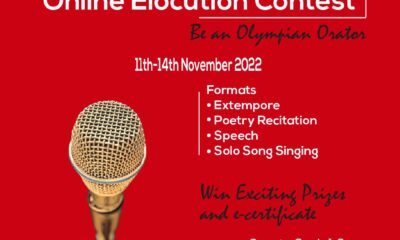
 Uncategorized3 years ago
Uncategorized3 years agoOnline Elocution Contest
-

 Poems4 years ago
Poems4 years agoPoems
-
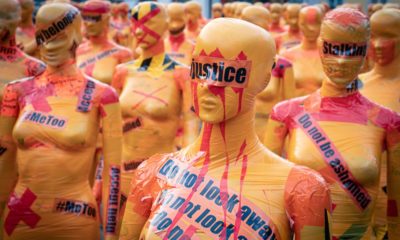
 Legal Talks4 years ago
Legal Talks4 years agoCUSTODIAL RAPE IN LIGHT OF THE MATHURA GANG RAPE CASE
-
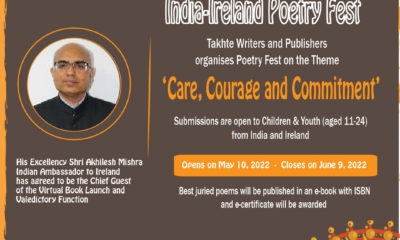
 Poems3 years ago
Poems3 years agoIndia-Ireland Poetry Fest
-

 Legal Talks4 years ago
Legal Talks4 years agoCompliances Relating to the Commercialization of Electronic Devices
-

 Art & Culture4 years ago
Art & Culture4 years agoThe Lore of the Days of Yore: Significance of History
-

 Legal Talks4 years ago
Legal Talks4 years agoPrivacy Laws & Consent while using Image of Random People Clicked on Street for Facial Recognition
-
Short-story4 years ago
Bibek’s visit at his friend’s bungalow
